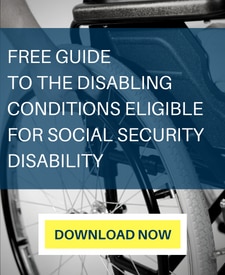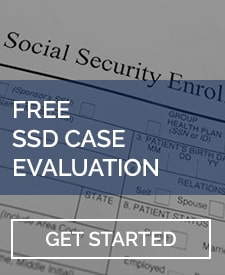1. Back Pain:
Back pain is one of the most common conditions used when applying for disability benefits. The more severe your back pain the more the pain will affect your ability to maintain regular full-time employment, no matter the physical nature of your position.
While back pain is not a diagnosed condition, it is an indicator of a condition. There are many spinal disorders that may cause significant back pain. Some of these disorders include stenosis, osteoarthritis, spondylosis, degenerative disc disease, and facet arthritis. As with most of these conditions, stenosis can occur in the neck, mid-back or lower back. Stenosis occurs when the space around the spinal cord narrows. Some of the typical symptoms of stenosis include burning pain in your upper and/or lower extremities, numbness or tingling, or weakness. Osteoarthritis can also occur at any level of the spine. Osteoarthritis is the breakdown of the cartilage of joints and discs. 
All of these conditions are typically treated either conservatively or surgically. Conservative treatment may include narcotic pain medication, physical therapy, or even spinal injections. Surgical intervention may include a fusion, decompression, or laminectomy.
2. Heart Conditions:
There are several types of heart disease and cardiovascular issues which may affect your ability to work. Some of the main cardiovascular conditions I come across in my daily practice include coronary artery disease, congestive heart failure, heart attacks or arrhythmias. Coronary artery disease occurs when plaque builds up in your arteries thereby narrowing your arteries and decreasing blood flow to your heart. Common symptoms of coronary artery disease include chest pain and shortness of breath. A complete blockage in one of your arteries will most likely cause a heart attack. Congestive heart failure occurs when the heart is pumping blood weaker than normal. As a result, your body is not getting enough oxygen. The third type of heart condition is arrhythmia. An arrhythmia is an irregular heartbeat. Meaning, your heart is beating out of rhythm. This can be either too fast or too slow. Treatment for any heart condition may include a recommendation to exercise or reduce your stress levels. Or, your cardiologist may prescribe medications or even surgical intervention.
When determining your eligibility for disability benefits, social security will consider how your cardiovascular condition affects your physical and/or psychological capacity. If severe enough, you may be approved for disability benefits.
3. Psychiatric Conditions:
Individuals may apply for disability benefits not only for physical conditions but also for psychological conditions. If you suffer from a psychological disorder, your condition may affect your ability to maintain a regular schedule, stay focused throughout the workday, or even work in coordination with other co-workers, all factors which will determine the type of job you are able to perform. The most typical psychiatric conditions include depression, anxiety, PTSD, or intellectual disability. Depression is a brain disorder that may affect your ability to work, sleep, study, eat or even enjoy life. Some of the typical symptoms include persistent sad feelings, feelings of hopelessness or worthlessness, fatigue, difficulty concentrating, insomnia, or even thoughts of suicide. Anxiety is different from depression in that this condition causes feelings of worry or fear that are overwhelming. This may include panic attacks or social anxiety. Symptoms of depression include feelings of panic, shortness of breath, heart palpitations, nausea or dizziness. PTSD is a stress disorder, similar to anxiety. However, PTSD causes a fight or flight response in individuals, typically after a terrifying ordeal involving the threat of physical harm. The final common condition is an intellectual disability. This condition measures your intellectual functioning or your intelligence typically obtained through IQ testing. Generally, an IQ score of 70 or less indicates limitations in intellectual functioning. Having limited intelligence can affect the types of jobs you are able to learn and perform. It also may affect your ability to follow directions. Whatever your psychiatric condition, if it affects your ability to leave the house, be around people, stay focused, or even understand directions, you will most likely have difficulty working on a full-time basis and thus should apply for disability benefits.
4.Cancer:

5. Carpal Tunnel Syndrome:
Carpal tunnel syndrome is a condition that causes numbness and tingling in your arm or hands. Sometimes this condition may even cause weakness. This is because the condition causes a pinched nerve in your arm or wrist. The reason this condition is common among disability applications is that it is a common disorder, affecting approximately 10 million Americans. This condition is caused by repetitive motions of the hands. Most jobs require good use of both of your hands. For example, receptionists, telemarketers, and factory line workers all need good use of both of their hands to perform these jobs. If you are struggling to hold objects, or use buttons or zippers you will probably have difficulty performing even the most basic types of employment.
6. Obesity:
More than two-thirds of the American adult population is either overweight or obese. Obesity in and of itself is not enough to obtain disability benefits. However, the effects of your obesity may likely exacerbate another condition, thus affecting your ability to work. Obesity may worsen your back pain or heart condition. It also may worsen your psychiatric condition by causing fatigue or decreased concentration. The social security administration has a specific regulation they must follow when evaluating how an individual’s obesity affects their ability to work.
If you suffer from any one of these six conditions, I urge you to seek guidance from an experienced social security attorney. At the LaBovick Law Group, we handle cases like this on a frequent basis and know exactly what information is needed to obtain your benefits. Having an attorney help you with your disability claim is always recommended. But in these types of cases, there are a lot of legal arguments that need to be made, which only an experienced disability attorney would know how to do.




